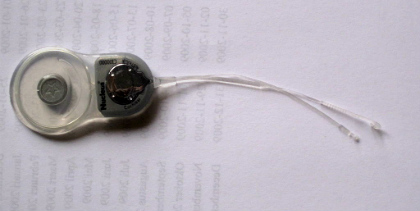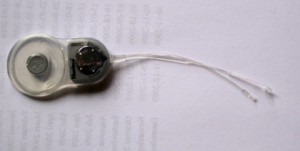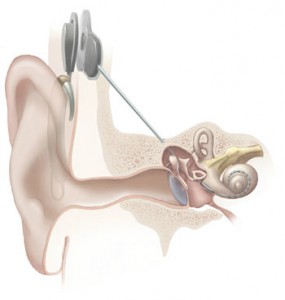
February 25, 2016, by Emma Lowry
International Cochlear Implant Day

Internal part of a cochlear implant (model Cochlear Freedom 24 RE). Image credit: Edwtie; engineer and cochlear implant wearer
Cochlear implants are one of the biggest health technology success stories of recent times. NHS trusts around the UK are routinely using them to restore hearing to children and adults with profound deafness. Without their ‘bionic ears’, these individuals would be unable to do many tasks that most of us take for granted.
They would not be able to hear the phone ring, listen to the radio, or hold a spoken conversation. While cochlear implants do not restore ‘normal’ hearing, they do provide enough access to sound to allow implant users to identify everyday sounds, become aware of sounds around them, and to hold spoken conversations in quiet environments. This health technology has had a profound effect on the lives of thousands of deaf individuals in the UK who wished to regain a sense of hearing.

Illustration of a cochlear implant
Nottingham has played an important role in the history of cochlear implantation in the UK. Today, the implants are provided routinely to deaf children as young as 12 months old. The Nottingham Auditory Implant Programme was the first to provide a cochlear implant to a deaf child in the UK. Since that time, Nottingham’s implant programme has grown to be one of the largest in the UK and their highly-experienced team provides implantation services to both children and adults.
Today, cochlear implantation is regarded as a safe and effective health technology. The widespread use of cochlear implants throughout the UK was supported by evidence gathered by scientists at the Medical Research Council Institute of Hearing Research in Nottingham during the 1990s and early 2000s. Their research demonstrated that cochlear implantation is a cost-effective use of our limited NHS resources.
Nottingham continues to be at the forefront of this hearing technology research. The NIHR Nottingham Hearing Biomedical Research Unit (part of the National Institute for Health Research), together with the Institute of Hearing Research and five implant programmes from around the UK, including Nottingham’s, is currently pushing the boundaries of cochlear implantation by conducting the first UK study of implantation in adults who have deafness in one ear only (single-sided deafness).
The partnership between the Institute of Hearing Research, the Nottingham Hearing Biomedical Research Unit, and the Nottingham Auditory Implant Programme means that Nottingham is now a hub for cochlear implantation research in the UK. Over 400 patients have participated in related research studies in Nottingham in the last 12 months alone. This partnership creates a pathway for basic scientific discoveries to be tested in clinical trials and translated into clinical practice, and is focussed on improving patient benefit through cochlear implantation.
If you would like to find out more, please contact Dr Pádraig Kitterick, cochlear implantation research lead at the Nottingham Hearing Biomedical Research Unit, on 01158232626 or at padraig.kitterick@nottingham.ac.uk.
No comments yet, fill out a comment to be the first

Leave a Reply